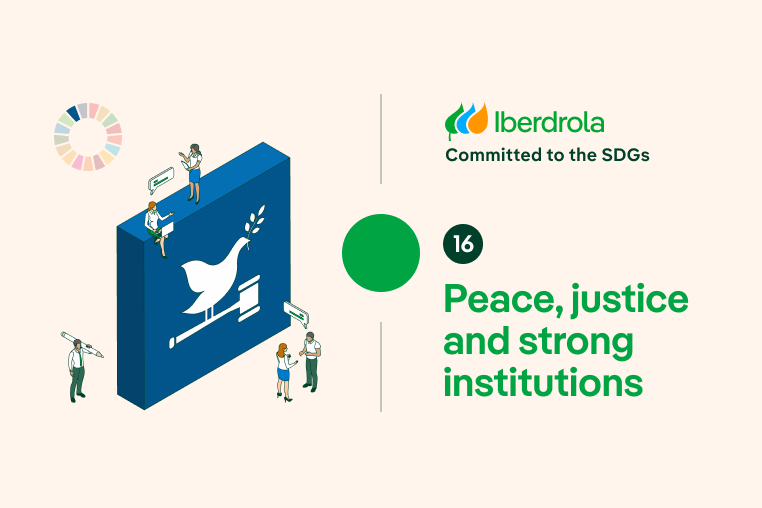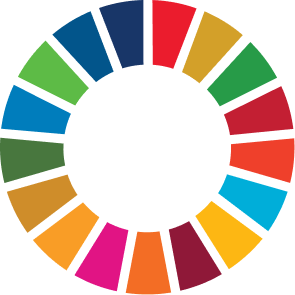SDG 16: Peace, justice and strong institutions
International benchmarks for governance, ethics and transparency
Corporate social responsibility
Iberdrola's Governance and Sustainability System is founded on ethics, transparency and best international practice in matters of good management, with the aim of defending the public interest and creating sustainable value for all its Stakeholders. The company supports a culture of zero tolerance towards corruption and fraud and promotes the study and dissemination of the principles of business and professional ethics.
Goal 16: Peace, justice and strong institutions. Video voice transcription (Spanish version) [PDF]
Our contribution to SDG 16: Peace, justice and strong institutions
![]() Iberdrola has adapted its regulatory system to the three main areas used by the international investment community to measure the impact and sustainability of its investments, which are the environmental, social and governance (ESG) aspects. Therefore, this set of regulations has been renamed the Governance and Sustainability System which is divided into five books: By-Laws, Purpose, Environment and Climate Action, Social Commitment and Corporate Governance.
Iberdrola has adapted its regulatory system to the three main areas used by the international investment community to measure the impact and sustainability of its investments, which are the environmental, social and governance (ESG) aspects. Therefore, this set of regulations has been renamed the Governance and Sustainability System which is divided into five books: By-Laws, Purpose, Environment and Climate Action, Social Commitment and Corporate Governance.
![]() Iberdrola promotes a culture of zero tolerance towards corruption and fraud, that forms the foundation for its Compliance System
Iberdrola promotes a culture of zero tolerance towards corruption and fraud, that forms the foundation for its Compliance System which is efficient, independent and under a continuous process of review to ensure that the company functions in accordance with ethics and current legislation.
which is efficient, independent and under a continuous process of review to ensure that the company functions in accordance with ethics and current legislation.
![]() In 2021, Iberdrola renewed the certifications granted in 2017 by AENOR: UNE-ISO 37001, for its anti-bribery management system, and UNE 19601, for its criminal compliance management systems.
In 2021, Iberdrola renewed the certifications granted in 2017 by AENOR: UNE-ISO 37001, for its anti-bribery management system, and UNE 19601, for its criminal compliance management systems.
![]() The group has a whistleblowing channel for reporting activity that is irregular or potentially contravenes the law or the company's Code of Conduct for Directors, Professionals and Suppliers.
The group has a whistleblowing channel for reporting activity that is irregular or potentially contravenes the law or the company's Code of Conduct for Directors, Professionals and Suppliers.
![]() First European utility and first IBEX-listed company to get approval for its global privacy and data protection standards, aligned with the new General Data Protection Regulation (GDPR).
First European utility and first IBEX-listed company to get approval for its global privacy and data protection standards, aligned with the new General Data Protection Regulation (GDPR).
![]() Creation of the Iberdrola Financial and Business Ethics Chair at the Universidad Pontificia Comillas, as well as extension of the Iberdrola Sustainable Development Goal Chair at the Universidad Politécnica de Madrid to include business ethics.
Creation of the Iberdrola Financial and Business Ethics Chair at the Universidad Pontificia Comillas, as well as extension of the Iberdrola Sustainable Development Goal Chair at the Universidad Politécnica de Madrid to include business ethics.
![]() Launch of a compliance platform with blockchain technology, in collaboration with the Association of Registrars, Deloitte and the Institute of Compliance Officers.
Launch of a compliance platform with blockchain technology, in collaboration with the Association of Registrars, Deloitte and the Institute of Compliance Officers.
These good practices have made Iberdrola the deserving winner of a number of prizes, awards and certifications, including:
-
Recognition as the world's best utility in dissemination of ESG information and as the first company in Europe in the category Print-Based Alternative Reports, in the worldwide ranking of the League of American Communications Professionals (LACP).
-
Inclusion for the tenth consecutive year on the Ethisphere Institute's World Most Ethical Companies list.
-
Recognised on ten occasions as the Spanish company with the best corporate governance practices, according to the World Finance publication.
-
Compliance Leader Verification certification from the Ethisphere Institute for its Compliance System.
-
First Spanish company to obtain AENOR certification for its Tax Compliance Management System in accordance with the requirements set by the UNE 19602 standard.
-
Expansion Prize for the company with the best compliance practices, 2018-2019
What is Sustainable Development Goal 16: Peace, justice and strong institutions?
SDG 16 seeks to promote just, peaceful and inclusive societies, ensure access to justice and build efficient and responsible institutions. For this it is necessary to reduce all forms of violence and mortality rates throughout the world; put an end to ill-treatment, exploitation and human trafficking and the torture of children; promote the full rule of law and guarantee access to equal justice for all. It also sets out to reduce corruption and bribery, among other targets.
Why is it so important to achieve SDG 16: Peace, justice and strong institutions?
Sustainable development includes achieving peace, human rights and effective governability. Some regions enjoy permanent levels of peace and security; others, conversely, go through cycles of conflict and violence (some almost permanently). Our world is ever more divided and we must try to find peace and fraternity, which can be done with everyone's help.
Weak institutions, insecurity, conflict and limited access to justice continue to threaten sustainable development. According to the United Nations (UN) in its Sustainable Development Goals Report 2023, 108.4 million people were forcibly displaced worldwide by the end of 2022. This represents an increase of 19 million compared to the end of 2021, and two and a half times the figure of a decade ago.
The same report states that there were approximately 458,000 homicides in 2021, amid escalating socio-political and gang violence in regions such as Latin America and the Caribbean and sub-Saharan Africa. This is the highest number of intentional homicides in the last two decades, causing more deaths worldwide than conflicts and terrorist killings combined.
Meanwhile, despite the protections of international law, there was an unprecedented 53% increase in civilian deaths in armed conflict between 2021 and 2022. At least 16,988 civilians were killed directly in 12 of the world's deadliest conflicts, the first such increase since the adoption of the 2030 Agenda, due in large part to the war in Ukraine.
Structural injustices, inequalities and emerging human rights challenges are pushing the achievement of peaceful and inclusive societies further and further away. Reverting this situation will only be possible with the involvement of all players at a global level. This is why promoting peace, justice and strong institutions is SDG 16 of the 17 UN Sustainable Development Goals approved in September 2015, as part of 2030 Agenda.
Iberdrola aligned with the Objectives of Sustainable Development
Keys to understanding peace and justice in the world
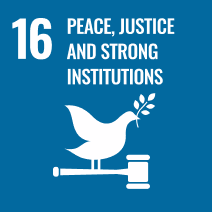
-
Displaced persons 108.4 million people are forcibly displaced from their homes, fleeing war, persecution or natural disasters.
-
Killings of civilians Civilian deaths in armed conflict increase by 53% in 2022, an unprecedented rise to nearly 17,000 casualties.
-
Prison overcrowding More than 30% of the world's prisoners (11.2 million) are held without a conviction.
Least peaceful countries

- Afghanistan
- Iraq
- Russia
- Syria
- Ukraine
- D. R. of Congo
- Somalia
- Sudan
- South Sudan
- Yemen

Main causes
Religious conflicts, the political and economic interests of countries, social and economic inequalities - which give rise to political extremism, conflict and violence - and the support of certain organisations and countries for the arms industry.

How can we advance peace and justice?
We need to strengthen the rule of law and human rights and reduce the flow of illicit arms. We need to help developing countries increase their exports and boost fair, open and mutually beneficial international trade.
Sources: UN and Global Peace Index (2023)
SDG 16 targets: Peace, justice and strong institutions
The specific targets set for the year 2030 are:
- To reduce all forms of violence and put an end to ill-treatment, exploitation and human trafficking.
- To promote the rule of law and guarantee equal access to justice.
- To reduce the flow of illicit finance and arms, corruption and bribery in all their forms.
- To provide access to legal identity for all people through birth registrations.
- To guarantee public access to information and the protection of basic freedoms through national laws and international accords.
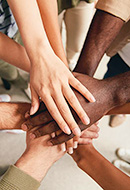
Human Rights
The respect for human rights at Iberdrola, our commitment.
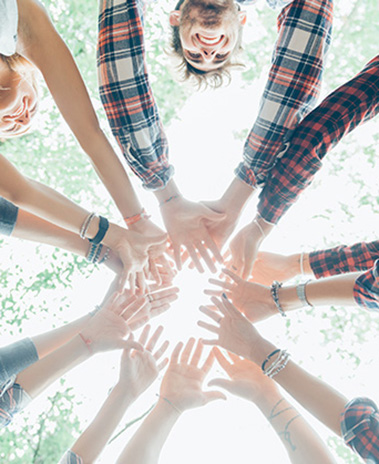
Human Rights Day
A day to commemorate the Universal Declaration of Human Rights.
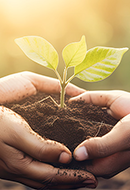
We promote responsible management
We integrate sustainability into the company's strategy and management.





